Today, thousands of international travelers have decided to visit Saudi Arabia for the first time for tourism, to see family, for business or even religious pilgrimage. Many visitors will probably not have even met a Saudi before and possibly won’t have many ideas about how to deal with them.
So, after many years of residing in the kingdom, I decided to do a little research and also to offer my own perspective on the character of Saudi men and to show how you can best deal with them.
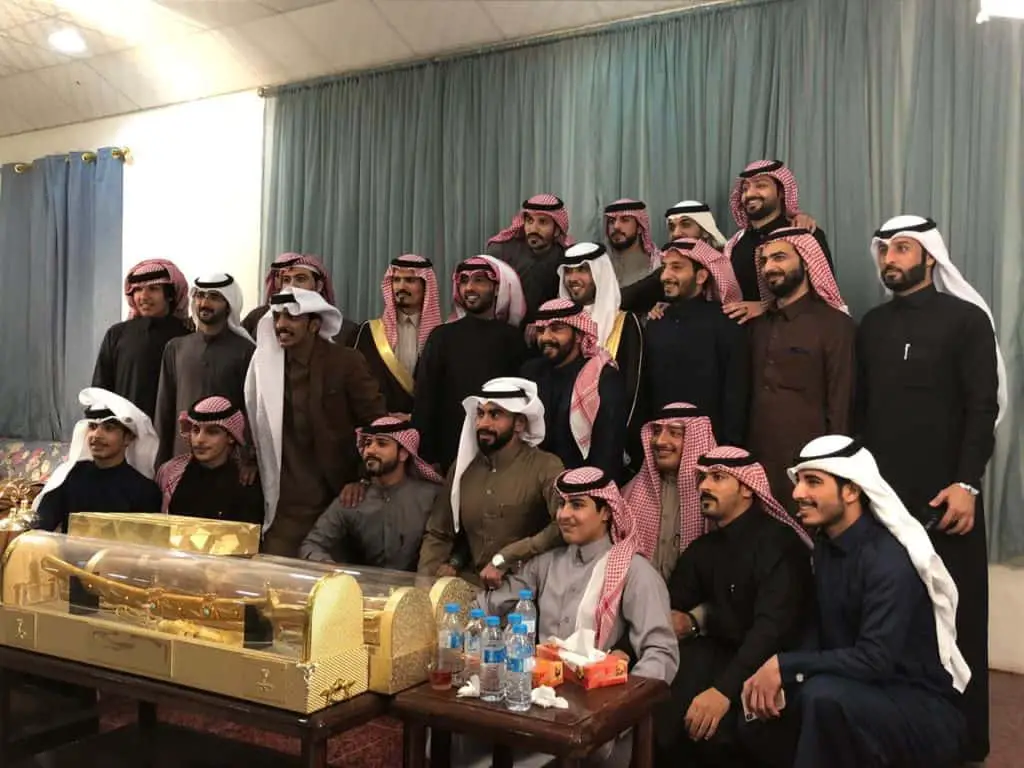
So, what are the Saudi men really like?
In general, Saudi men are traditional, warm, proud, welcoming and caring. Also, they can be shy, and due to their culture, they love to be very generous with money and time. They can also be very impulsive, aggressive, and hot-tempered especially on the road. Most are sincere, formally courteous and very family orientated. If you have a good Saudi friend you will be very fortunate indeed.
Knowing more about the national character and outlook of Saudi men will greatly assist you when you are traveling in and around Saudi Arabia. As with any other culture, it will help to improve social relations, develop new friends, and give you better ways to deal with conflict or difficult situations if and when they occur.
Bedouin Customs Prevail
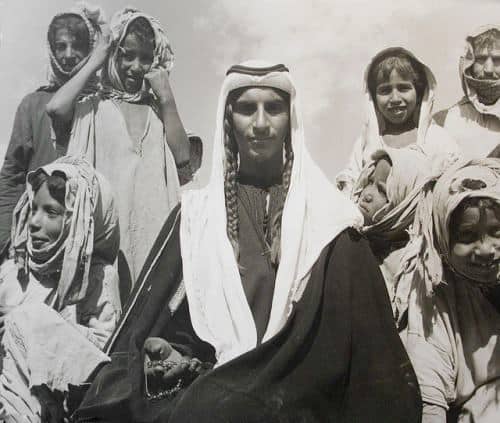
Essentially, Saudi men are bedouin in nature. Though today, nearly all live a fully modern lifestyle, their history and characters were formed by centuries of living in a harsh desert or mountain environments.
Customs and attitudes that once prevailed in the desert or mountains over generations are still very apparent today in the Saudi men’s character. They include the central importance of tribe and the good treatment of guests.
At the heart of the Saudi man is his tribe or family together with the obligation he feels towards guests who are to be treated well and warmly welcomed to his home with great hospitality.
Being Invited To Saudi Homes
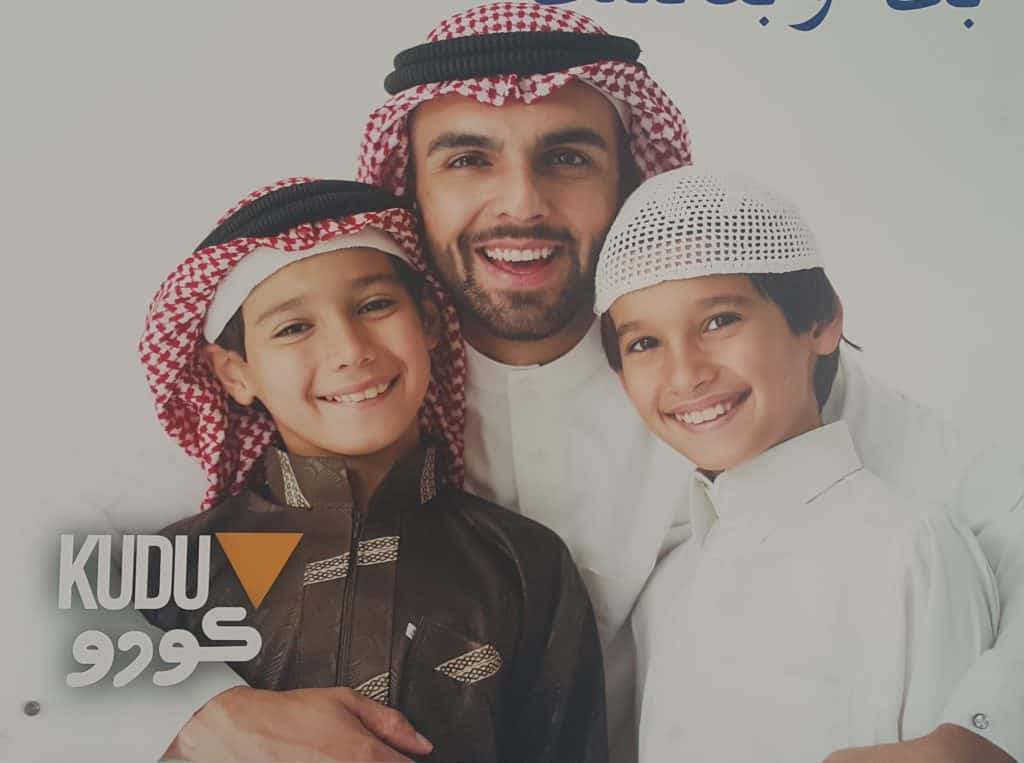
I get endless invitations to Saudi homes. It is an occurrence repeated many times every day. When I go to the mosque or when I meet a Saudi man in shopping centers or other places, inevitably he will invite me back to his home to eat or to drink coffee and to share some time with him and his family.
The same thing is very likely to happen to you when you come to the kingdom.
After some initial chit chat, the conversation usually goes something like this:

Strange Invitation Ritual
At first, this effusive push-pull verbal ritual seemed very strange. Such an open welcoming invitation is not something you would normally experience in the western world.
At first, I wondered if all these food/coffee invites were really genuine. So, I decided to test them out and started to accept them instead of always refusing.
What I found was that not only were they genuine, but that this is also a normal behavior amongst Saudis themselves.
Saudis formally invite and visit each other frequently to eat, chat and share a coffee. At the weekends, family members usually go to visit houses of the extended family. Friends regularly visit other friends etc.
Inviting is a normal custom for Saudis and they delight in doing it.
Note: Nonfamily men visit men and women visit other women ONLY. If you are a couple, you will still get invitations for both you and your partner.
However, when you get to the house there is always a separate guest room for men to sit and socialize and a separate one for women usually in the kitchen and/or the adjacent rooms.
During the visit do not insist on keeping your partner next to you and having him/her sit with members of the opposite sex. It is very likely to cause offense and will make for difficult social relations
Accepting An Invitation For Coffee/Food
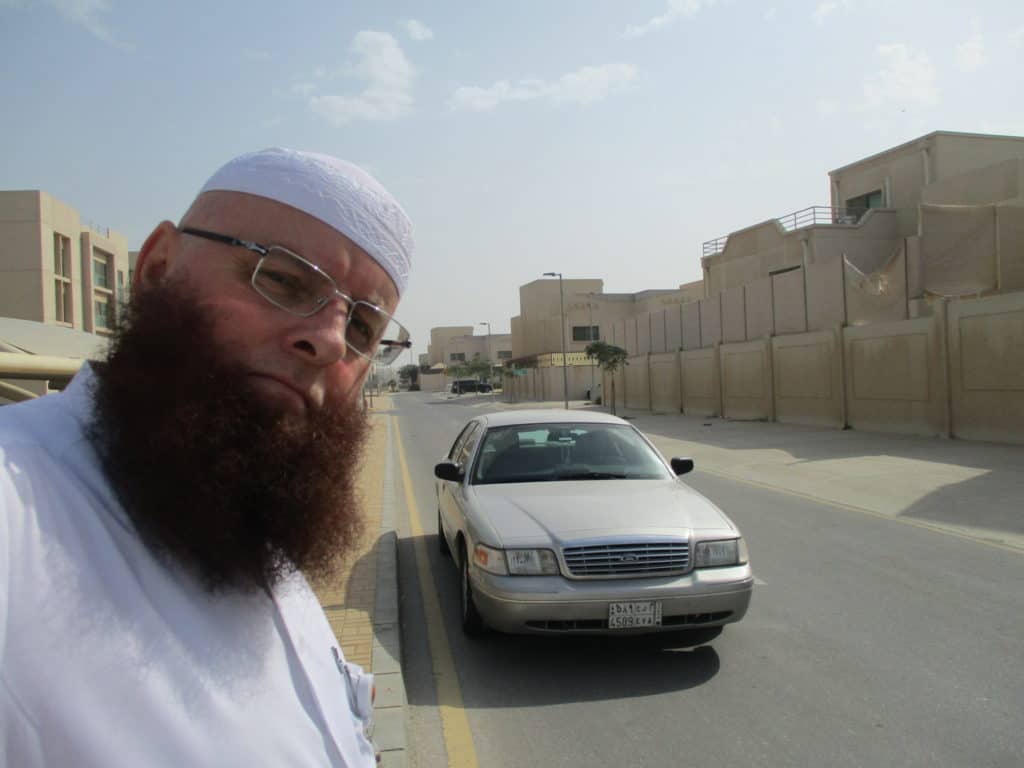
When you get invitations to eat and drink at a Saudi home remember that you will be asked to sit in the guest room or Majlis, an area specially prepared for receiving guests.
Usually, it decorated in the traditional rural style. It contains wall to wall seating which is often at floor level or in a low seating arrangement. Get used to sitting/eating off the floor
You will also find tea/coffee making facilities in the room and lots of decorative coffee pots, some ornaments and possibly wall hangings.
If you are invited to eat lunch, take some Arabic cookies or chocolates (20-30 SR) especially if you are a woman.
Here is a list of dos and don’ts that you should follow when you get invited to someone’s house or toa public event:
| The Do’s | |
| 1 | Wash your feet and/ or use clean socks before you come |
| 2 | Cover ALL tattoos-They are prohibited in Islam |
| 2 | Arrive early before the meal to drink coffee/juice and to chat |
| 3 | Take off shoes/sandals and leave them at the Majlis door entrance |
| 4 | Look down to the floor as you enter the premises-it’s respectful to the host. (Avoid trying to peep into other rooms and corridors) |
| 5 | Remain seated and spend some time trying to relax |
| 6 | Patiently wait for the food/coffee to arrive (It’s being made for you right now.) |
| 7 | Stand up as the guests arrive one by one to shake their hands |
| 8 | Engage in social chit chat and pleasantries with others in the normal way (Saudis love to ask and answer questions repeatedly about life and how things are.) |
| 9 | Wait to be served- The eldest son or father will usually serve you |
| 10 | Take the Arabic coffee cup ONLY with your RIGHT HAND after it is poured! |
| 11 | Accept another cup of coffee by raising your cup. (The host will be attentive and only give you a small amount in the cup so that you WILL ask for more.) |
| 12 | Put your hand over the coffee cup, raise your hand and shake/wobble it up and down. (This indicates you have drunk enough and don’t want a refill.) |
| 13 | Wash your hands before eating. (The host will direct ALL the guests to the washbasin located outside the Majlis before food is served.) |
| 14 | Before putting food in your mouth say Bis mil Leh |
| 15 | Eat and/or dink using your right hand ONLY! Keep the left hand well out of the way! |
| 16 | Eat rice/chicken using your right hand rather like you’d eat french fries or burgers. (The host usually provides a spoon or fork for foreign guests) |
| 17 | After you finish eating say, ‘Alhumdu Lil Leh’ |
| 18 | Express thanks then stand up to indicate you want to wash your hands and ask the host permission to go to the washbasins. |
| 19 | Stay around for more coffee and chats. (The host will bring perfume and/or burning incense to you in a holder. Waft the smoke with your hand into your face/clothing.) |
| 20 | As guests start to leave, plan your departure-thank the host then ask to leave. (The host will show you to the exit door) |
| The Don’ts | |
| 1 | Enter the guest room wearing footwear |
| 2 | Ask the host about his wife or adult female family members |
| 3 | Use your left hand for shaking hands, eating and drinking |
| 4 | Smoke in the guest room |
| 5 | Say no to food or drink |
| 6 | Be Impatient with your host |
| 7 | Be disrespectful to old men |
| 8 | Be lewd or use toilet humor |
| 9 | Fart out loud |
| 10 | Sit with your legs extended and feet pointing at other people |
| 11 | Take photos or films of others without consent |
| 12 | Go drunk |
| 13 | Joke about pork, or prohibited things, dating, open sex, drugs, etc (Haram) |
| 13 | Criticize Saudi Arabia, The King or Islam |
| 14 | Sing, dance or dab-ever |
| 15 | Leave the Majlis without thanking the host |
The Characters of Young Saudi Men
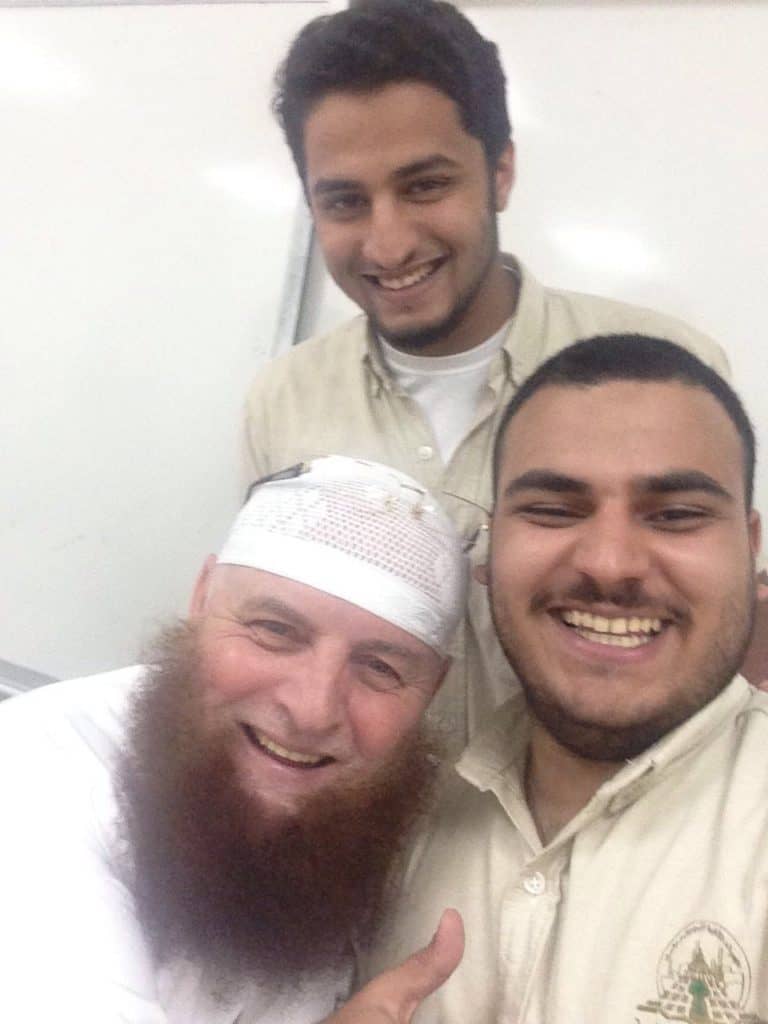
Every day, I face hundreds of young Saudi men and in all honesty, I really like them. On the whole, like most Arabs, Saudi men are very respectful of others, even the most energetic youth.
Their characters are very traditional, warm, proud and welcoming. Unlike western men, they are not vulgar or offensive. They speak words of kindness and sincerity.
Young Saudi men are actually a bit shy of older men. They are taught to remain quiet in their presence and not to speak over them. In their homes, they allow fathers and grandfathers to speak, remain quiet and are very obedient towards them.
For this reason, my students show me great deference and respect. In class, they are sometimes raucous and noisy, but generally, they are very well behaved indeed in my presence.
In all my years, I have never had occasions to severely reprimand or call a student to task. I found this astounding since I recall the outrageous behavior of some UK school children and the kinds of personal and social problems I have encountered there.
Influence of Islam On the National Character

Islam is a powerful shaper of the Saudi national character. The Holy Quran was revealed in Mecca in Saudi Arabia and its truth is embodied in the receiver of those divine transmissions in the living examples of our beloved Prophet Mohammed (SAW) and in those of his companions (Sahaba) who surrounded and shared their everything with him.
Islamic Greetings
The greetings that Prophet Mohammed (SAW) strongly encouraged the Sahabah to use repeatedly when meeting others 1,500 years ago is still very much alive today.
(Click here to read the Hadiths in the Book of Greetings on Sunnah.com)
When Saudi men or any Muslim for that matter meet they greet using the following:
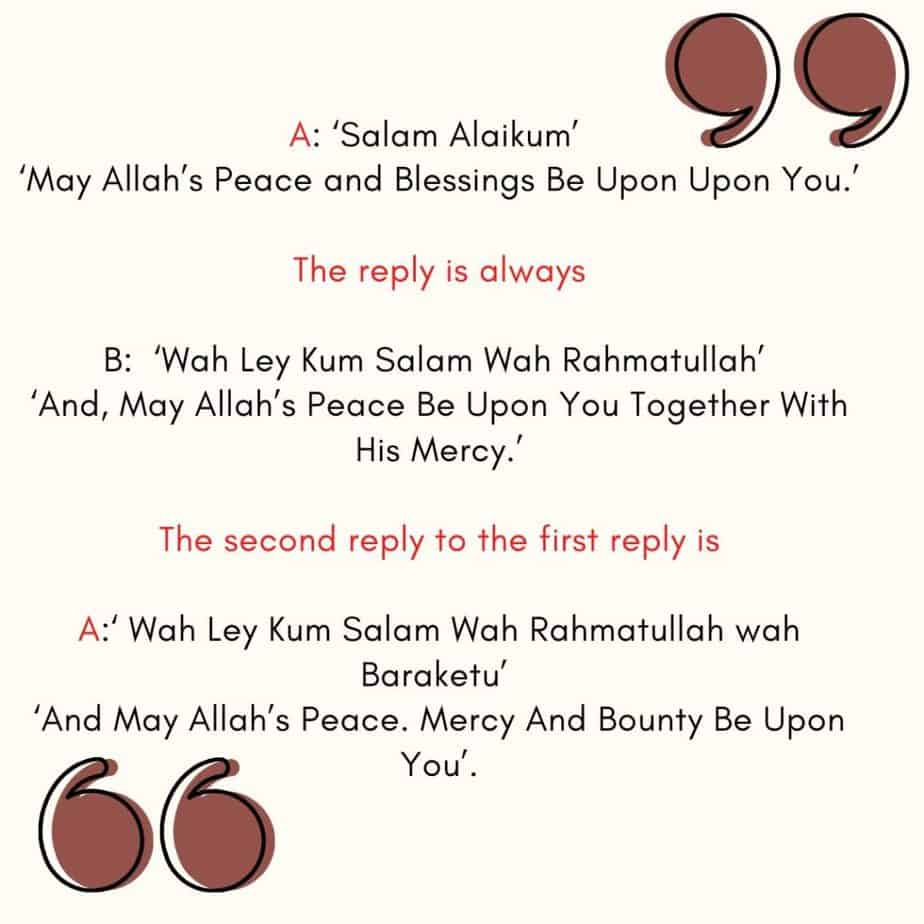
Today, everywhere I go around Saudi Arabia I am greeted with the term Salam Allekum. In the street, the market, the mosque, at work, as I enter the home, as I leave these places, this is the most common phrase I hear spoken by Saudi men and Muslims in general.
Greeting With a Kiss
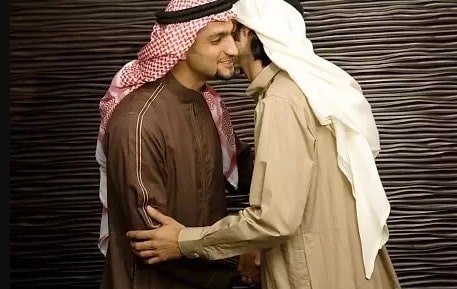
Saudi men try to outdo each other in wishing the bigger and better of the three greetings upon each other in order to get the increased blessing from Allah.
After saying Salam Allekum, Saudi men and Muslims shake hands by the right hand and kiss each other twice on one or both cheeks. They also warmly embrace the other.
Making Enquiries- Rapid Fire Questions
Between Saudis, the greeting is followed up by a rapid-fire of questions about his health, his life, his family, his business, his affairs in a remarkable display of verbal generosity you will ever witness. As a westerner, it seems almost comical to me but I understand that the intention is to show kindness and generosity.
Try doing this yourself and you will get a very positive response. It will set you up very well in a relationship with Saudi men and reflect on you as an empathic and likable person. It is a good idea to learn how to reply to the greeting of Salam Allekum.
Though it is not intended for non-Muslims, if you are and you use the greeting Salam Allekum, Muslims will feel delighted and really appreciate you.
When Prophet Mohammed (SAW) came upon a group of men, he made it his habit to use the above greetings three times. He encouraged all the Sahaba to greet in this manner all the time as a way to soften the hearts and to promote unity, friendship, and love between people.
Greeting By Touching Noses
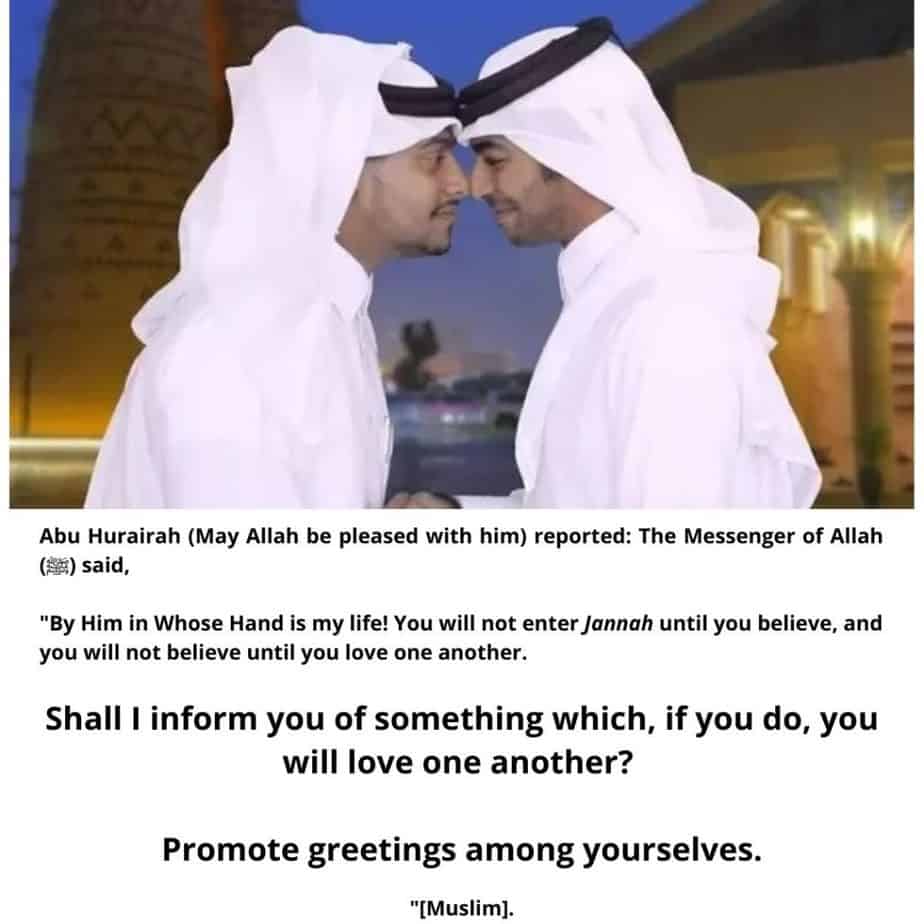
Another more Bedouin tradition is to greet by touching the nose. This usually occurs between young Saudi men and close friends. It is called ‘Khism’ or greeting by the nose.
Upon meeting, the Saudi man will approach the other, lean his head forward indicating he wants to greet using the nose. The other will respond by leaning his head forward and the tip of their noses will touch. They repeat this act of nose touching once, twice or three times more.
In Qatar, they do it up to six times consecutively which makes greeting men in large groups very lengthy indeed.
Men are Much Closer To Other Men
In the west, close male friendship is a rare thing, especially as young boys get older. Also, as time goes by, it takes so much more time to develop friendships and closeness between men.
However, I noticed that Saudi men are much closer to each other. This is because unlike in the west they are not competing for the attention of women. Day to day interaction with females outside the family is not practically possible.
In the absence of female company, men turn to each other for friendship and support and there is a much more closeness, affection, and tenderness in male social relations than I have ever seen in the west.
It is a common sight to see young men walking together down the road hand in hand. At first, I was rather surprised bu this. Even today, it would be something impossible in the West and if it occurred would be misunderstood for a homosexual closeness.
Saudi Men Saying I love You
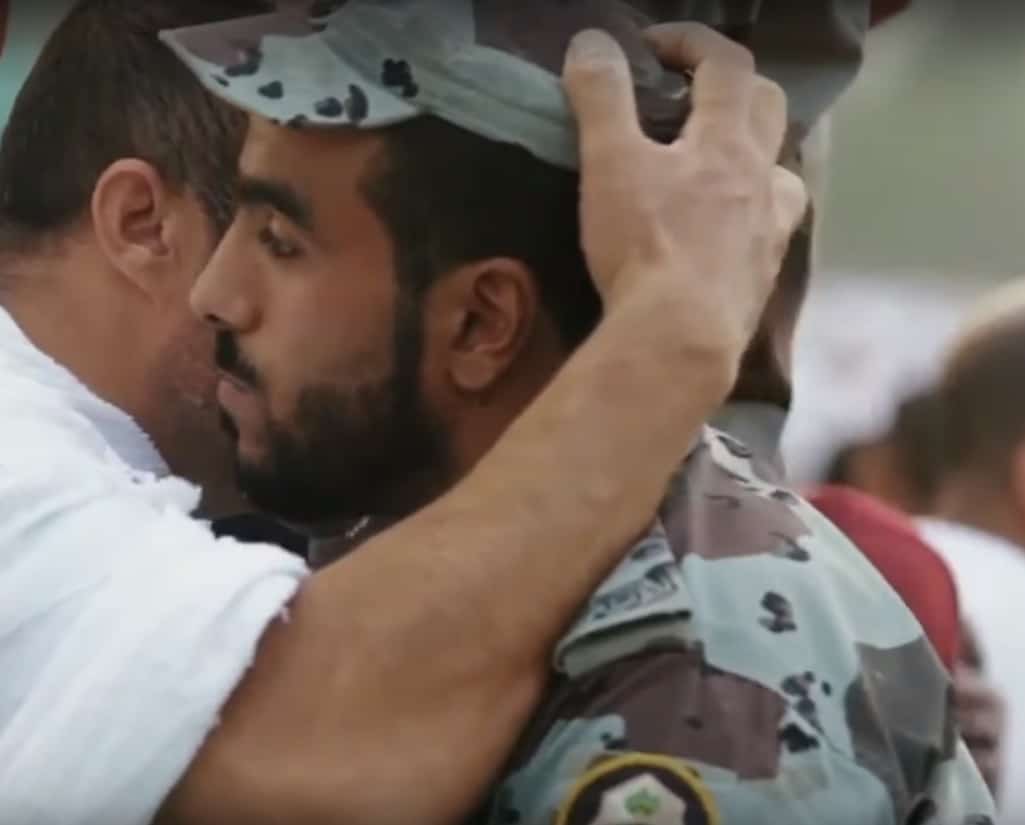
Also, Saudi men easily use the words ‘I love you’. It is not something gay, rather is it to be understood as words of endearment and strong affection. They often comment on how they love their friends, their fathers and males whoa re significant in their lives.
As a college teacher in Saudi Arabia, many of my students tell me that they love me. My heart turns to chocolate on hearing these words.
They approach me and hold my head and kiss it out of love and respect. This is a beautiful custom that even I and my own sons practice now.
When you visit the houses of Saudi people, you will see the young people kissing the heads of their father of grandfathers out of great respect.
Saudi Men And The Afternoon Nap
Ask a Saudi man what he loves to do in his free time and he will openly tell you he loves to play video games or else take a long sleep or to nap in the afternoon. That is the reason why I like to go to the supermarket in the afternoon at any time before 5 pm because I know that it will be very quiet and my shopping will be much easier to do.
Social life begins art Magrib time (5 pm) and especially at weekends can continue well into the early hours.
Saudi men are very sociable. They visit each other’s homes, in outhouses called (Majlis or Diwaneyas) sit, drink Arabic coffee, play cards (balot) and on occasion smoke hookah, Shisha or Ma’asal. It is much more common to see the Arab nationals smoke shisha. Some Saudi men and women do smoke it, but it is not commonplace in Saudi Arabia and it has been taxed heavily by the Saudi government to discourage its use.
The Five Daily Prayers
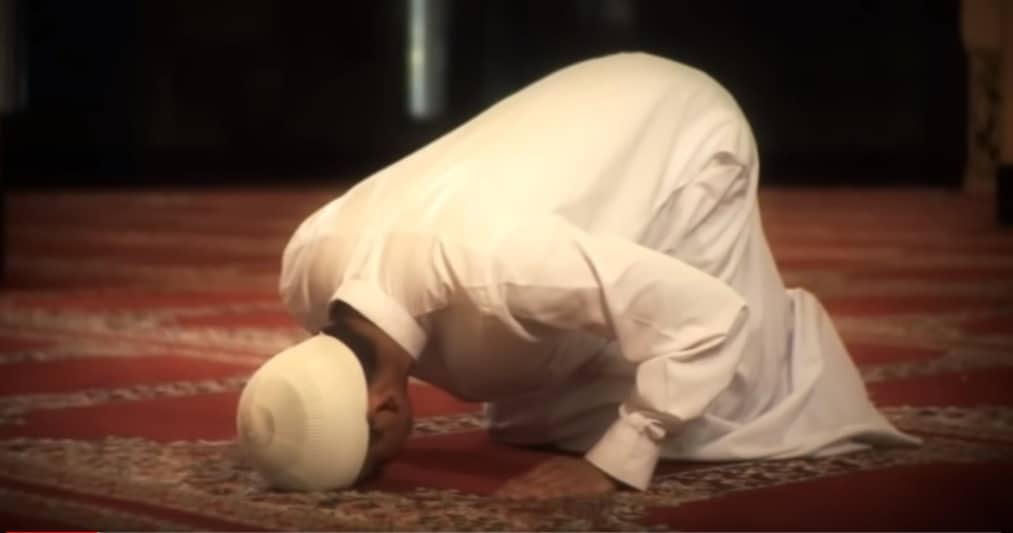
The five daily prayers have a big influence on the character of Saudi men.
They are:
- Fajr – Dawn
- Dhuhur- Midday
- Asr-Afternoon
- Magrib-Sunset
- Isha-Nighttime
For ten minutes throughout the day and night, the prayers are an opportunity to get closer to Allah (God) and they provide an important daily routine.
Before they pray, Saudi men wash themselves using the ritual purification called (Al Wudhu). The month, inside the nose, the head and feet are washed in warm water.
The result is that throughout the day, he becomes God-conscious. The fact that he formally meets Allah in prayer five times a day makes it unlikely that in the hours between prayers he will commit illegal or unethical (haram) acts.
His intention is to please Allah, to follow his injunctions and with the belief that that actions will have repercussions in the hereafter, day to day, he tries to live his life well.
I accept that are also many Saudi men who do not pray. It is the case! You will see them during the prayer times sitting together, chatting and smoking and in no rush to get anywhere not even to the mosque to offer the prayers.
If you quiz them, they reply, we will pray later.
Benefits Of The Five Daily Prayers
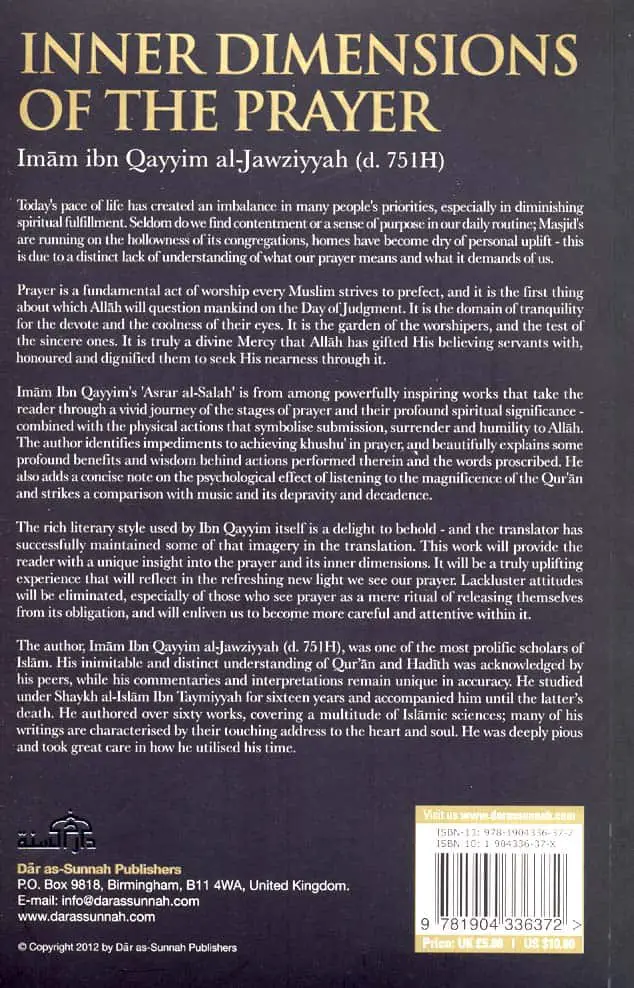
Our Prophet Mohammed (SAW) rushed to prayer when anything disturbed him in order to seek resolution and solace.
There are a number of benefits and the following is a list produced by the great Islamic scholar Ibn Qayyim al-Jawziyyah, the Shaikh of the heart!
Click to read the complete article about the benefits of Islamic prayer by Ibn Al Qayyim.
The five daily prayers:
- Produce spiritual sustenance
- Maintains Physical health
- Prevents Harm
- Shuns Sickness
- Makes a Strong Heart
- Brightens The Face
- Lifts The Soul
- Stops Laziness
- Makes The Body Active
- Increases Body Strength
- Expands The Chest (Confidence and Understanding)
- Nourishes The Soul
- Brightens The Heart
- Increases Allah’s Blessings
- Prevents Catastrophes
- Keeps The Devil away
- Brings You Closer To Allah (SWT)
To Saudi men, the five daily prayers are an anchor, a rejuvenation, a strength to the soul, a remedy against evil, a deep connection with the almighty, a means to goodness, health, enjoyment, wealth bliss and contentment in their lives.
The Countenance and Aspects of Saudi Men Who Pray

I have witnessed this many times over. When you look into the eyes of a Saudi man or even any Muslim for that matter who prays the five daily prayers, you immediately notice that his face and eyes are shiny and bright.
He smiles warmly, his eyes glint and twinkle. The light of his faith emanates from out of his body like a warm radiance. They look carefree, joyous and connected.
The reverse is also true. The Saudi men who ignore the prayer offerings I notice usually have a dull, lifeless aspect to their being. Their eyes seem dead and they are confused, nervous and prone to smoking and other useless distractions.
They look rather like most non-Muslims I meet in the West.
The Saudi Family and The Elders
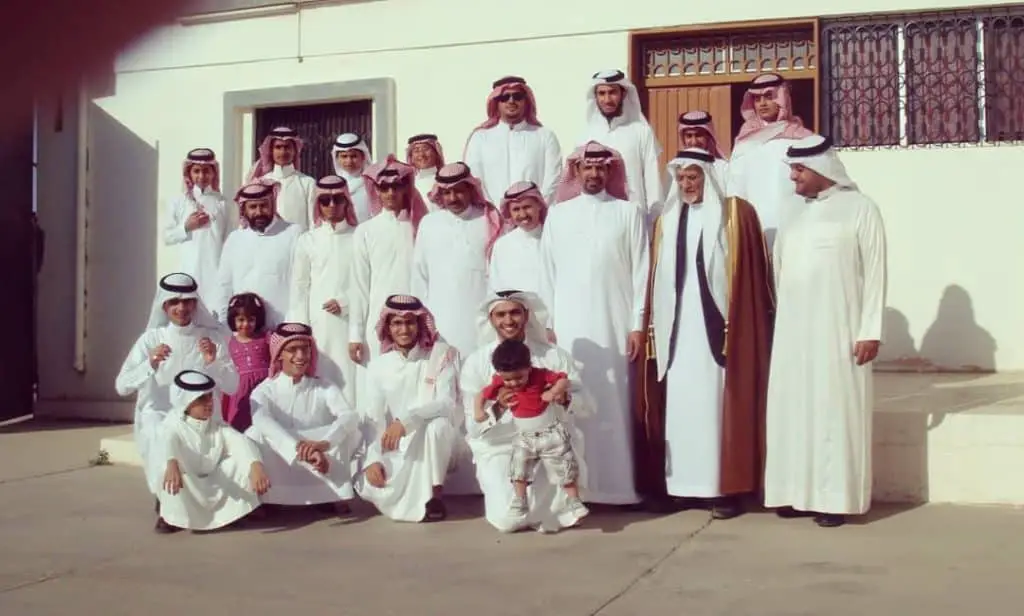
To a Saudi man, the family is number one. This includes his wife, children AND all the members of his extended family, all members of his tribe and all the family who passed away long before.
The strict hierarchy in the family means that he greatly respects his parents and grandparents. He serves, is obedient to them and does not speak out of turn in the presence of his father or grandfather.
This behavior spills over into the classroom. My Saudi students relate to me as an older father figure and show great deference to my age and status. It makes my life much easier!
Western Attitudes To The Old And Infirm

Contrast that to the treatment of old people in the West. The pressures of modern living and the fact that married couples do not possess the beliefs nor even the financial luxury of being able to personally take care of their parents or grandparents, old people in the West are often left to age and fester in hospitals, nursing homes, and care institutions.
In Saudi Arabia, like much of the Arab world, the old and infirm family members are cared for at home.
They are clothed, fed and attended upon in much the same way that children are.
They are highly valued and respected by younger Saudi men for the fact that in their younger days they too raised their children, grandchildren and worked hard and suffered all their lives to provide for them.
Young Saudi men feel a natural obligation to be there for their sick and infirm fathers or grandparents.
If he or she is unable to attend to the ailing family member, then they will employ an Asian caretaker usually from India or the Philippines.
In Saudi Arabia, you mostly see old men at the mosque attending the Friday (Jummah) prayers.
When I am in the mosque, my heart melts when I see them. I sympathize as they struggle to simply get in and out of their wheelchairs assisted by a son or Asian caretaker.
I remember that they were once young and active and that now they are nearing the end of their lives. I ask Allah (SAW) to protect me and to keep me healthy and it causes me to remember the wonderful health that I currently enjoy.
My son, Hamza, said the same thing to me one day in the mosque. He feels the same way too.
Today, the modern world is catching up with Saudi traditions. Read Hassan Bin Yousef Yassin’s account of the experience of aging Saudi men in relation to their families in the following Arab News article Óur world is showing too little respect for the old .
.
Saudi Men And Attitudes To Work
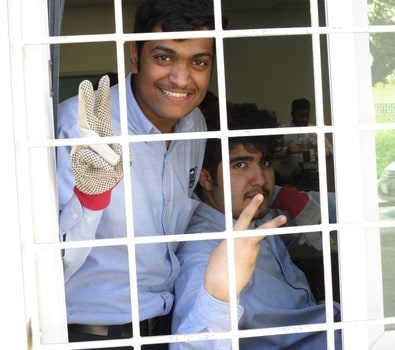
Outside observers are critical of Saudi male workers. They argue that they are lazy, uninterested in work, have poor skills, give little and ask for too much.
If that is true, (I don’t think it is 100%) the main reason is that during the 60s and 70s, in general, they did not need to work. The money came easily through royal patronage. Wealth and abundance of cash were being generated by the oil industries and it easily filtered down to the people.
However, oil prices fell in the 90s and the cost of living rose and after 1960, the Saudi population exploded.
Saudi Arabia eventually fell into debt and the free wealth stopped flowing. Life began to get difficult for Saudis.
Today because of Saudization, there are many more national employed in government and the private sector industries.
However, I have noticed a different attitude to work in Saudis compared to other foreign nationals. It is not that Saudis are lazy! It is simply that they do not appear to have developed an especially strong work ethos.
I know that for generations in the UK, people were raised with the protestant work ethic. This is a national belief or attitude that makes work and productivity central to their lives. It is the belief in an honest day’s work for an honest day’s pay.
It was the basis of the industrial revolution and the reason why Britain created an empire and strongly prevailed throughout the two world wars.
It must also be true that out of economic necessity, Americans and Asian nationals work very hard in much the same way.
This is not something you readily find in the character of Saudi men. The focus of their work is not especially about productivity, rather achieving it and at the same time keeping social and establishing good relations.
Also, Saudi men prefer to be business owners and recipients of wealth. If he has to be an employee, then he prefers office-based, managerial type jobs where he can delegate and organize workers.
Like most Arabs, Saudi men are not raised to be self-sufficient and resourceful. They are indulged at home as their mothers, sisters or maids cook and clean around them.
Perhaps, this is a little unfair. And I know it is not true in every instance. I have personally seen a number of very hardworking and helpful Saudi employees who are equal too if not better than any foreign counterpart.
However, I have experienced this attitude over and over and very similar observations have been made by foreign workers in companies that are obliged to employ Saudi nationals through Saudization and Nitiqaat.
To read more about the issue of attitudes to employment, Saudization and Nitaqaat Program click through to the following in-depth article.
The Attitude Of Saudi Students In The Classroom

I have taught students in a number of Arab countries and generally, they are hungry learners. However, when I came to the Gulf, I was surprised by the attitude in the classroom of Saudi and Gulf students as a whole.
Apart from a few exceptions, most young Saudi men want the results but unfortunately are not always prepared to make the effort to achieve them.
Fortunately, I work in a college where the administration demands a level of hard work from students and does not reward them readily for any lack of productivity. Thankfully, it insists that students work for their results.
In the classroom, I am exigent and demand that students make a proper effort to develop and advance. If I teach them well, there is a good chance that they will rise to the challenge and succeed in their studies.
Some are motivated but they are perhaps fewer in number. I think the reason is that in Saudi schools, students are rewarded for simply having attended the classroom and exam results are more a matter of rote learning.
Students get rewarded with high marks for very little output and ultimately for the convenience and reputation of the classroom teacher.
Even at the college level, young Saudi men tend to maintain that old belief and have the expectation that the teacher will ‘help them’ with the extra marks to ensure their success in college courses.
This is a hangover from the Saudi school education where due to social pressure, teachers are expected to pass students with outstandingly high exam results.
I think too this dependent attitude continues into the workplace as extended family members ‘help’ applicants get job positions managed by government regulations that make it almost impossible to fire Saudi poorly performing employees.
Saudi Men and Attitudes To Marriage

I never discussed sex and marriage with Saudi men. They are shy to talk about these matters. However, they often do tell me that they wish to marry after the age of 25. Before then, they first want to get established in a job, save some money and perhaps do a bit of traveling.
They tell me that it is their mothers who fix them up with potential brides through family friends. Also, in the past, it was the case that men and women married only from the same tribe.
However, this attitude is relaxing. Some more traditional Saudis still insist on cousin marriages even in spite of the fact that it can result in Type 2 diabetes and diseases of the blood such as thalassemia, sickle cell, and spinal atrophy.
To that end, Saudi couples are legally obliged to take compatibility blood tests and genetic counseling in order to anticipate possible problems before any marriage takes place and
Today, because of the internet and social changes in Saudi Arabia regarding women in the workplace, romances are happening without the knowledge of parents.
Young people are meeting up online and secret romances are flourishing.
However, secret romances create broken hearts. I have comforted and consoled a number of young Saudi men who have fallen in love with a girl after secret meetings with her, but for one reason or another is unable to marry the girl due to parental opposition to the union.
Saudi Men Want To Marry Virgins
Unlike in the West, it is still the case that Arab/Saudi women (even men) have to remain virgins (Bikr) until the day of their marriage. Even after the marriage ceremony and reception, to all intents and purposes, the woman is still regarded as ‘unmarried’ until the marriage has been consummated.
Arab men and Saudis, in particular, want to marry a virgin girl. During the first meeting, (Shoofa), if there is some doubt, the issue will be raised and considered in the decision to marry or otherwise.
I do not know if the same expectation exists in quite the same way for Saudi men, but I doubt it.
These days, most younger Saudi men have only one wife. However, I know a number of older men in polygamous relationships. Saudi men first like to take a Saudi wife and later take another wife from a foreign usually Arab country like Syria, Egypt or Morocco.
In the past, the Bedouin tribes were known for polygamous relationships and having lots of children. Today, due to financial constraints, I see the younger generations with two or three children only!
Marriage and Financial Burdens
In Saudi Arabia as in the Arab world as a whole, marriage is a huge financial commitment and a burden that will stay with them for years long after the wedding has taken place. Wedding expenses are huge.
There are two wedding halls to pay for, (men and women) food for hundreds of guests, a newly furnished house, gold jewelry, clothes and a dowry (Mahr)
All told only the marriage and wedding can cost 100,000 SR. Young Saudi men have to save up money for years, take out bank loans or else rely on their fathers for financial support.
Saudi Men Love Their Traditional Clothes

Saudi men love to dress in the traditional white thobe and sport the red or whitehead with a head ring (agal).
The thobe is a beautiful, white cotton tube-like shirt which reaches to the feet. It is made- to- measure and costs about 120-200 SR to hand sew in the tailor’s shop. A tailor in Saudi Arabia is either an Asian or Yemeni national.
You can buy poorer fitting off the shelf white thobes for about 60-100 SR.
The headdress has three parts. On his head, he wears a skull cap (Taagheya or Kufi). (10 SR) On top of that, he wears the red and white or headdress (Shaameg) or thin white (Gutra) that hangs on either side of his head and billows as he walks. (It costs 40- 200 SR)
The headdress is held in place using a black corded ring (Igal). It fits loosely on the crown of the head is a little weighty so as to keep the headgear in place. (25-80 SR)
Under the thobe on his legs, he puts on light white cotton under trousers called a ‘Sirwel’ or together with light white cotton underwear. They cost 10-20 SR.
On his feet, he wears soft shoes (200-300 SR) or open leather sandals (150-300 SR). The best models of sandals are Turkish or Italian.
Saudi men prefer open-backed sandals that he can slip on and off as he enters and exits the home or the mosque. I like them too, but personally, I prefer sandals with back straps.
Normal shoes are hot and cumbersome and tend to confine the feel except in an environment cooled by AC. Sandals allow the feet to breathe and stay cool.
Most Saudi kids go about the home, the yard and in the car in bare feet, especially in the sandy, desert environments.
What Saudi Men Wear In Winter
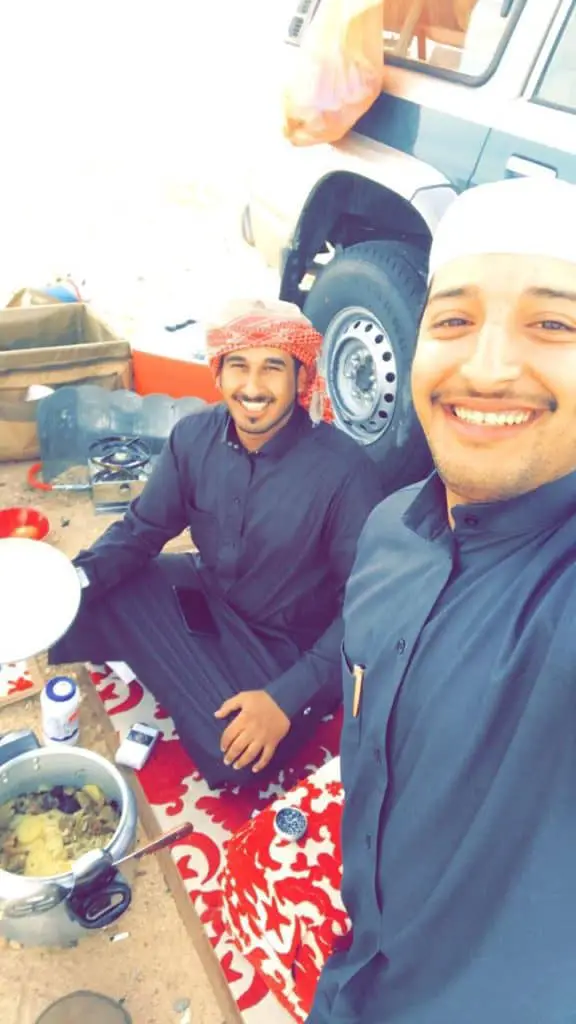
During the cooler months, (Dec-March) Saudi men like to wear specially tailored brown, blue or grey wool or polyester/cotton colored thobes. They also put on insulated undergarments, warmer socks, and shoes.
At night and for the early morning prayer, it is common for Saudi men to put on a brown or blue-colored (Farwa) that is a thick wholly cloak that is furry on the inside. It is open and does not zip up.
They also use it to cover the head especially if it is a large fit. It costs about 500SR. It can be used for many years since it is only used for the coldest two or three months of the year.
There is a lighter version made of muslin type material trimmed in gold thread that is used for weddings and formal occasions. The left arm is inserted in the sleeve while the right arm simply holds the Bisht across the body in a semi-formal pose.
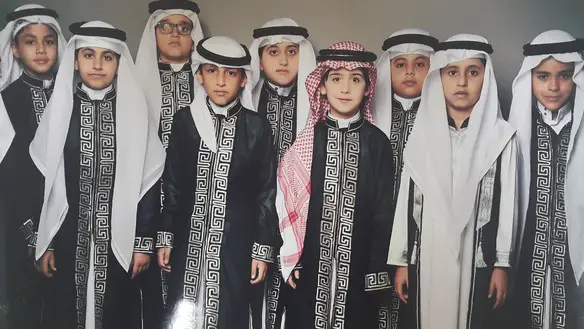
Saudi Man And Casual Western Attire
At work, especially in industrial environments, traditional clothes cannot be worn. Practically, Saudi workers must wear a rugged cotton shirt, slacks, and requisite safety shoes.
Except for government workers, shops or in the office where traditional clothes are the requirement, the usual work dress is a shirt/trousers combination.
I have to stress that the Saudi thobe and headgear is still very clearly the preferred dress style for Saudi men. More and more, however, I see young men wearing casual, fashionable brand clothing styles.
Young men in Saudi Arabia are very highly fashion conscious and love to follow the fashion trends as in any other country.
Be Sure To Follow These Customs To Avoid Offense
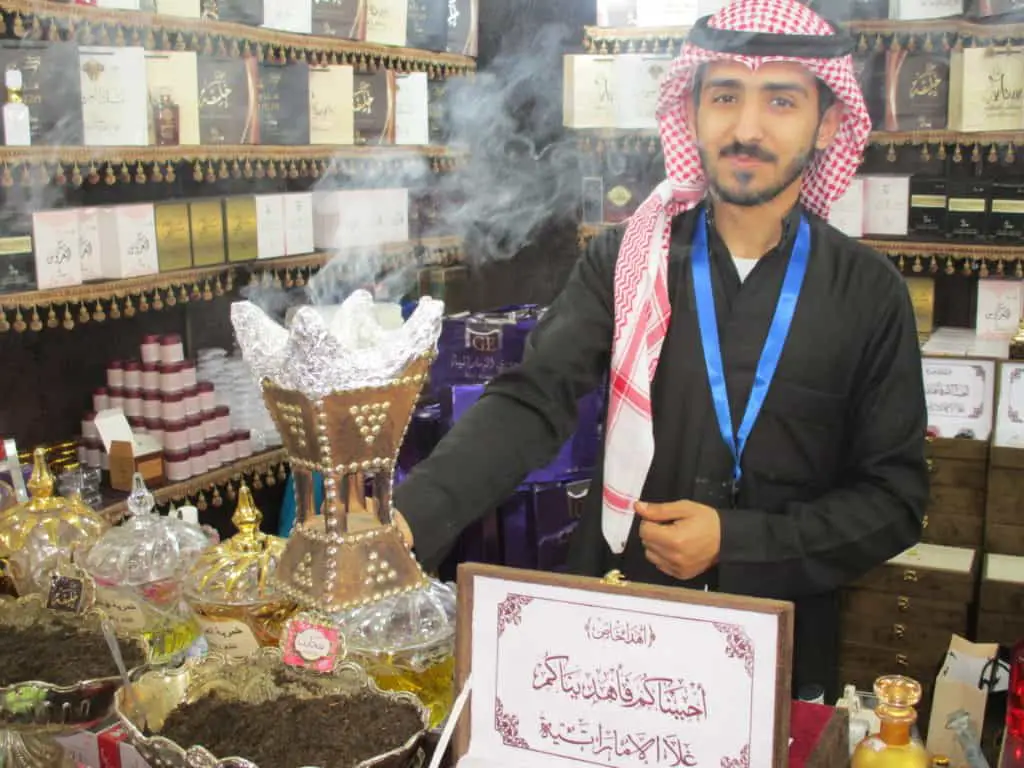
On the whole, Saudi men are shy in public. In groups, they play and banter loudly! They can be noisy, but never aggressive or threatening.
When walking by a group of Saudis (two or three or more) be sure to say Salam Allekum in acknowledgment as you walk by.
By using this term, you are indicating you are not a threat, rather its a friendly greeting and that you wish them well.
Be sure to greet Saudi men with a handshake and a cheek kiss or two. This will really get you accepted and established.
Start all interactions with a cup of coffee, friendly social chat, and banter. Don’t get fussy and be in a rush to get things done. Take your time and chill out before doing any kind of business or social activity.
Remember, you are not in your own country. Guests too must follow certain protocols. Don’t insist he should do his duty immediately or demand he does things your way.
Simply suggest, ask politely, but most of all- impress and make friends.
Use The Term Inshallah (If God Wills) Frequently!
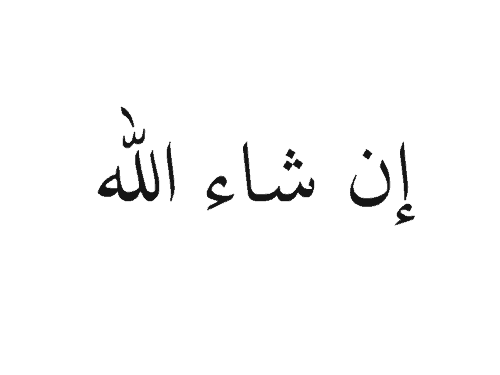
When you make plans or express hopes, wishes or future desires with a Saudi man always use the term Inshallah (If God Wills) frequently!
As you express an intention to do anything or make plans, hope or wish for things ALWAYS end your words with the term Inshallah.
Inshallah means God Willing. Desires, plans, future projects are more likely to have better outcomes if this term is uttered at the same time the intention is being expressed.
At first, I used to find Muslims using this term quite annoying. I wanted my plans to be certain and I insisted others commit 100%. Leaving it just to the will of Allah SWT) (God) seemed half-hearted and too loose a commitment.
However, I came to understand that by using Inshallah in this way, I was in effect evoking a strong blessing and establishing certainty in their minds at least that the project or plans would be at some point be successfully realized.
So now, I don’t forget to use the term Inshallah frequently!
Avoid Admiring Personal Effects If You Can

There is a custom amongst Saudi men and in GCC countries that if you like something they own, they insist to physically give it to you. It’s a beautiful custom!
I have gotten to such a point that today, I try to stop complimenting others on beautiful items they possess such as clothing or expensive accessories.
If I do, I know that Saudi men will try to give it to me as a gift. For example, if I say ‘Oh Ali, I love that wristwatch’, he will immediately take it off and insist that I take it. By that point, I usually feel very awkward and embarrassed.
So then I reply, ‘Ali, I love that watch on you, not for me’.
However, he will insist on giving it to me with the words ‘I swear by God’ (Wal Lah), I will give it to you. Then, I have an endless fight on my hands to NOT accept it.
Try Adding The words ‘Ma’shallah’ When You Compliment Someone Or Something
The best way to compliment a Saudi man and/or his possessions is to say first, for example, Ali, that is a beautiful item’ and then immediately follow up with the words Ma’shallah (By God’s Will).
Adding the words Ma’shallah (By God’s Will) you will have in effect canceled out the evil eye or (Hassood) which Muslims and Saudis believe accompanies a kind word or compliment.
So, each time you say something nice or add a compliment about personal items say something to the effect of:
‘Oh, Mohammed, I really like such and such, Mashallah Ta Barak Allah!’
It will have the effect of putting everyone at ease and canceling out any evil intention that Muslims believe comes with every such utterance, said positively or negatively.
Behaviours Saudi Men Consider Taboo
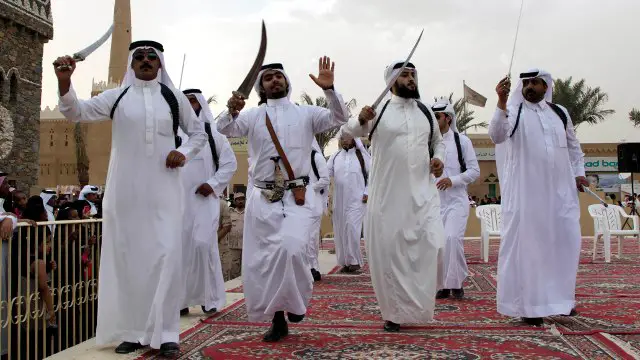
Saudi men don’t and you should not either. Do not do the following when keeping company in Saudi Arabia.
Keeping Your Shoes Inside The House or Sitting Area
Take your shoes or sandals off BEFORE entering someone’s house and DO NOT walk around on carpets with your shoes on. It is considered very dirty indeed.
Sitting on the floor with your feet pointing in the direction of others

Saudi men probably won’t tell you, but sitting and pointing the flats of your feet towards them in a social situation will really offend them. Try tucking your legs in a bit under your body as you sit on the floor or in the very least point your feet well away from others.
I don’t know why it is that way.
Remember, the Iraqi reporter who in a press conference threw his shoes at Ex-President George W Bush and how Iraqi people slapped the fallen statues with sandals and shoes of the dictator Saddam Hussein on the fall of Iraq?
Feet and shoes are the ultimate insults, I guess.
Using your left hand for shaking hands, eating and drinking
In Saudi Arabia and in the Muslim world, the left hand is used for washing the genitals with water after peeing and the anus after defecation. It is the ultimate insult to use the left hand to shake hands with others or to eat and drink with the left hand.
Avoid it at your peril!
Farting out loud in the company of others
Farting and toilet humor are a complete no-no in Saudi Arabia. I never heard a Saudi/Muslim let one-off nor have I heard them even joke about farting or using toilet humor.
This is a peculiarly western habit that is NOT at all accepted or appreciated by Saudi people-that is in public at least!
The bum and genitals are part of the awrah an area of the body prohibited to show in public.
Click to read more about the awrah and ways non-muslim visitors to Saudi Arabia should dress.
Singing, dancing or playing music in public
Saudis love their traditional music but even in spite of the changes and the new openness to music and public entertainment in the kingdom, the majority of Saudis/Muslims you will meet on your travels will not take very kindly to your dancing, singing or making music in public.
Leave your guitar, musical instruments or ghetto blasters at home or at the very least be discreet about playing them in public areas.
You will get into trouble if you forget this one!
Wearing Shorts That End Below The Knees

Wearing bathing trunks and/or shorts pants with the legs that end ABOVE the knees is illegal today in Saudi Arabia. Various Fatwas condemn it and it is the police can fine you up to 3,000 SR for doing so.
Your clothes should adequately cover your ‘awrah’ or certain ‘private’ parts of the body.
For men in Islam, the ‘awrah’ is the area starting just above the belly button and ending to just below the knees. The form of dress for men anywhere in the Islamic world must conform to this norm for it to be either legally or socially acceptable.
Read more about the Awarah in my article How non-Muslims Should Dress in Saudi Arabia
Going naked or acts of nudity
Watch Saudi men when you are on a beach, you will see that they are almost completely covered from the neck down to the feet when they swim in the sea. Men wear teeshirts and very long shorts or swimming trunks.
There are very strict laws in place concerning how to dress in public. The laws apply very strictly to both men and women.
Going skinny dipping, displays of nakedness and being even partially uncovered (nudity) will not be tolerated. You will get arrested, fined and deported.
Click and read this article to get familiar with how men should dress in Saudi Arabia and the penalties.
Kissing, fondling and open displays of sexual affection
I walk arm in arm with my wife when we are out in public. However, I would NEVER kiss her in public, hold her close to me or grab or fondle her affectionately.
Such displays are completely prohibited, will greatly offend and draw undue attention to yourself by the police.
Sexual/love relations are a private matter not for the eyes of others.
In all my years, I NEVER even heard Saudi men discuss matters of sex or the physical aspects of their relationship with their wives, etc.
It is something that you should avoid completely at all costs.
Taking photographs of others without their permission
Since Dec 2019, it is a punishable offense to take photos or videos of people in public without their permission. Fine can reach up to 3,000 SR if caught!
Wearing offensive teeshirt slogans and/or images
Take care of what you printed items you wear. For example, vinyl prints of cannabis leaves, naked women, rude, controversial slogans and idioms are prohibited and illegal. Fines can also reach up to 3,000 SR for violations.
Complaining about or criticizing Saudi Arabia, the King or Islam
I have personally known some foreigners who were unable to keep their mouths shut and expressed criticisms of aspects of Saudi Arabia online or in public spaces. They were immediately deported.
Such criticism is normal and acceptable in western democratic nations but illegal and punishable in an Islamic state. Such behavior will get you arrested, fined and deported.
Saudi men openly discuss political and social issues but are very careful to avoid harsh criticism of their government, the royal family and especially Islam.
Types of Saudi Men
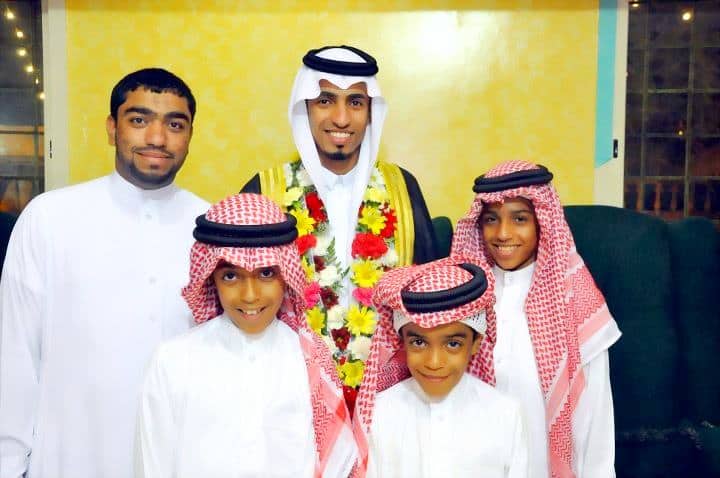
Over the years, I have met thousands of Saudi men and it is fair to say that like every other nationality on earth their personalities differ in so many ways.
Some Saudis are outgoing, effusive, loud and pushy. Others are quiet and shy. Others are kind and love to get to know you. Some are very religious.
Others can be outright rude and could not care a toss about you and they simply ignore you. It really all depends.
However, without trying to generalize too much, I have noticed that there are some distinct types of men in the Saudi population. Knowing who they are and what they think and believe will help you to quickly get to know them and learn how to deal with them.
The following types are all made up of my general impressions that over time I have formed based on my years of close contact with many Saudi men and of my understanding of the culture and the Islamic religion.
They are descriptive and deliberately general. They are NOT based on scientific or sociological interpretations of the personalities of Saudi men. Simply, they are based on my own understanding and interpretation of how I have witnessed Saudi men personally over the years.
In reality, of course, people are not one type rather an interesting hotchpot of individual characteristics and human complexes.
But, for the sake of elucidation, here is what I have experienced:
- Bedouin Type
- Traditional Type
- Modern Type
- Religious Type
- Multicultural Type
The Bedouin Type
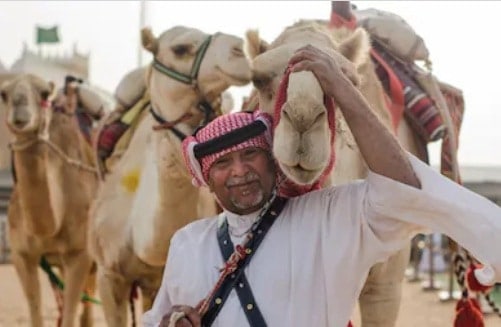
Today, a typical Bedouin Saudi is a city/town dweller but has a strong identity with his desert history, traditions and culture. He distinguishes himself from other city types of Saudis in that he lives and maintains the old ways of doing things.
He often refers back to his grandfathers and feels pride as he holds on tight to old standards and practices.
For example, a Bedouin will spend his free time in desert camps, rearing and keeping camels, lauding over his tribe, telling stories of old, using desert vocabulary and naming his children with Arabic Bedouin words that are often used to describe the desert, the weather, and the natural elements.
He loves desert music, Islam and has a very strict relationship with his extended family, in matters of marriage and desert customs.
As you might expect, their characters are gruff and rough. They are raucous. They love humor, sitting/standing in groups, chatting and drinking lots of tea and /coffee.
Young Bedouin type men love to smoke. They also are casual, friendly and very kind. They will do anything for you. They take you places in their cars, buy your food, help you and show great kindness and generosity. They are amazing actually!
Bedouin men often take multiple wives. Often times, they marry without even seeing their prospective wives. Even during the marriage, some wives will not reveal their faces even to their husbands by keeping the Niqaab on around the home.
They have a lot of children. Their kids are streetwise, rough and ready and sometimes unkempt in appearance.
These are the descendants of the hardy Bedouin tribes, the war heroes who fought alongside King Abdul Aziz in his efforts to liberate and unify Saudi Arabia 1902-1932. These people comprised the majority of the population of Saudi Arabia before the discovery of oil and modernization.
The Traditional Type
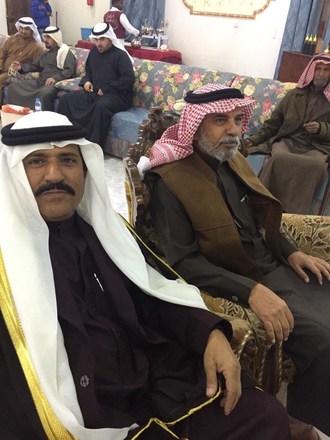
Unlike the Bedouin, a traditional Saudi man is thoroughly urban but identifies strongly with his national characteristics and traits. His beliefs are those aspects of culture and tradition that make him uniquely Saudi as opposed to other Arabs and non-Arabs.
The indicators are the Saudi clothes, (Thobe and Shemagh), his love and loyalty to the extended family and his tribe, his praise of the King and Royal family, traditional Saudi practices such as poetry, the Majlis, Arabic coffee, camels and displays of generosity especially for house guests
A traditional Saudi man likes to pride himself on being a pure Arab. He is very interested in family origins, bloodlines, tribal allegiances, and loyalties. Being pure of blood and hailing from a long line of untainted Arab blood makes him feel proud.
He uses the purity of blood and special customs as reasons to distinguish himself from other Arabs and non-Arabs. It is how he identifies himself as Saudi and from which he seeks entitlement.
Traditional Saudis live well, work in normal jobs, have houses, apartments and villas and are fully immersed in modern lifestyles. He goes to the desert at weekends and has a camp there which he uses in the cooler months.
Modern Type

A modern Saudi man is the most recent generation of the Bedouin and Traditional types of Saudi. They are the Arab millennials and the sons of daughters of the families that in the 60s and 70s escaped country life to get established in jobs and houses located in urban towns and cities.
They were born raised in the urban areas, took their education in Saudi Arabic medium schools and by necessity know English and quite a lot about the outside world.
They are the computer/internet generation. They spent their childhood watching satellite TV, playing Playstation and online chatting and using Apps.
To the Modern Saudi man, the Smartphone is everything. Each has the latest generation of Samsung, Apple, and Huawei devices, 24-hour access to the internet and he obsessively chats with absent friends using What’s Ap and sending and receiving images on Snapchat or other trendy social media tools.
You will see them in Malls and shopping centers, cafes, dressed in the latest dress fashion walking or sitting around and fully absorbed in Smartphone activities.
You will see them in sporty cars, swerving carelessly across the traffic driving lanes looking down at their Smartphone with one eye out on the traffic.
Ask them the time and they pull out a Smartphone. Suggest a meeting and it has to be recorded on the phone. Talk about some issue or another and they search for it online.
They are constantly distracted by their smartphones and unable to sit still for just one minute.
The Modern Saudi man has one foot rooted in the past and the other stretching out into the future possibilities.
The Religious Type
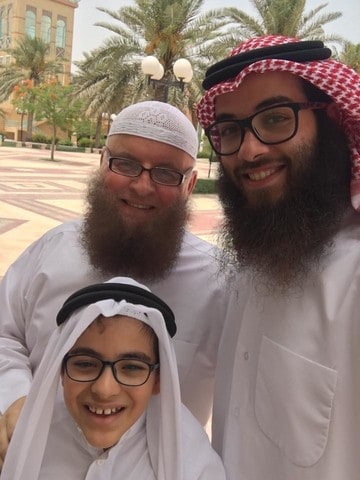
The quintessential Saudi Religious type is not especially concerned about impressing other people. He only wants to please God (Allah).
His mind and heart turn fully in the direction of the words of Allah (SWT) in the Holy Quran and in the living example of Prophet Mohammed (SAW), the Messenger of Allah and the greatest man in history.
The Saudi Religious type is a book worm, has shelves full of books and interpretations of the Holy Quran and Islam. He reads them obsessively. He attends the mosque 5 times a day, learns and recites verses from the Holy Quran, answers religious questions and is extremely knowledgeable on matters of religion and the heart.
The Saudi Religious type is an avid learner, a teacher, a thinker, a scientist, both an innovator and a traditionalist.
This type inspires great confidence and respect from others in the community for his religiosity and upstanding principles.
In appearance, he sports a long shiny beard, wears thobes that often reach halfway down the calves, a shemagh (red headcloth) unsupported by the weighty black agal head ring. Not wearing the Igal is a show of religiosity.
He walks purposefully in strides, smiles and genuinely greets others, is amiable and connects well to people.
The Saudi Religious type loves to attend talks and presentations about Islam. He will sit on the mosque floor listening patiently to sermons (Khutbah) gathering and very much appreciating the knowledge he receives.
He will drive kilometers to sit at the feet of other learned religious scholars sacrificing his own time and duties to his family for the sake of learning more about Islam and getting closer to Allah.
This type loves to help others for the sake of Allah. He is always willing, collects money, gives generously to the poor, visits the sick and makes prayers (dua) asking Allah to intervene in times of pain, suffering, and calamity.
The heart of the Saudi Religious type is always at ease. He relishes his internal peace and entirely submits himself to the will of Allah. He is optimistic, focused, uncompromising, selfless, joyful, principled, idealistic and he epitomizes the religious hopes and aspirations of millions of Muslims worldwide.
The Multicultural Type
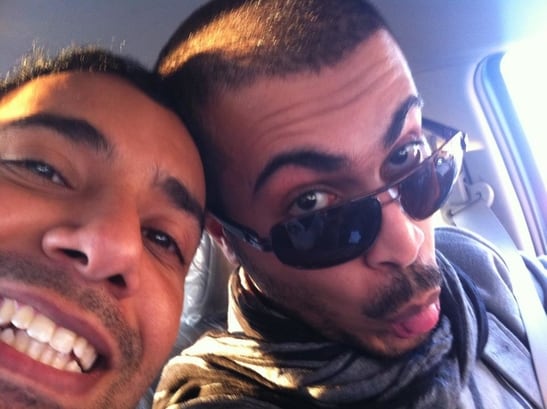
The Saudi Multicultural type is an internationalist. He travels abroad and is extensively online. He is identifiably Saudi but has the flavor and aspects of otherness. He appreciates Saudi culture but rarely indulges in public displays or ceremonies. He loves his country but equally values other national identities too.
This type prefers to wear a shirt and trousers, speaks English well and has peculiar preferences. For example, he is learning Italian, does Yoga, cooks Sushi, has friends in Mongolia or eats international foods
The Saudi Multicultural type is friendly, but not effusive or overly ingratiating. In fact, he shies away from the company of other people preferring lone pursuits. He will try things that most Saudi men do not especially like to do.
He is forward-thinking, a progressive, artistic and very much a philosopher. He is very sensitive and a good listener.
Also, there were things in his life that affected him, aspects of Saudi life that may have caused him some discomfort. So, out of harm’s reach, he learns about other cultures and their ways in places where the past cannot especially influence him. (My interpretation)
The Saudi Multicultural type is not overly religious, is not threatened by change or innovation and tries to accept others just how they are and expects others to do the same too.
Other Helpful Sources
- Wikipedia- Culture of Saudi Arabia

- Arab News- Things to Consider When Visiting a Saudi home

- Saudi Gazette- Forgotten Patients and Cry of Pain

- insidesaudi.com-Guide to Saudization and the Nitiqaat Program

- Arab News- Our Cruel World Is Showing Too Little Respect For The Old

- sunnah.com-The Book Of Greetings

- e.islamway.net-18 Benefits Prayer

- insidesaudi.com-The Commonsense Guide To How Non-Muslims Should Dress In Saudi Arabia

